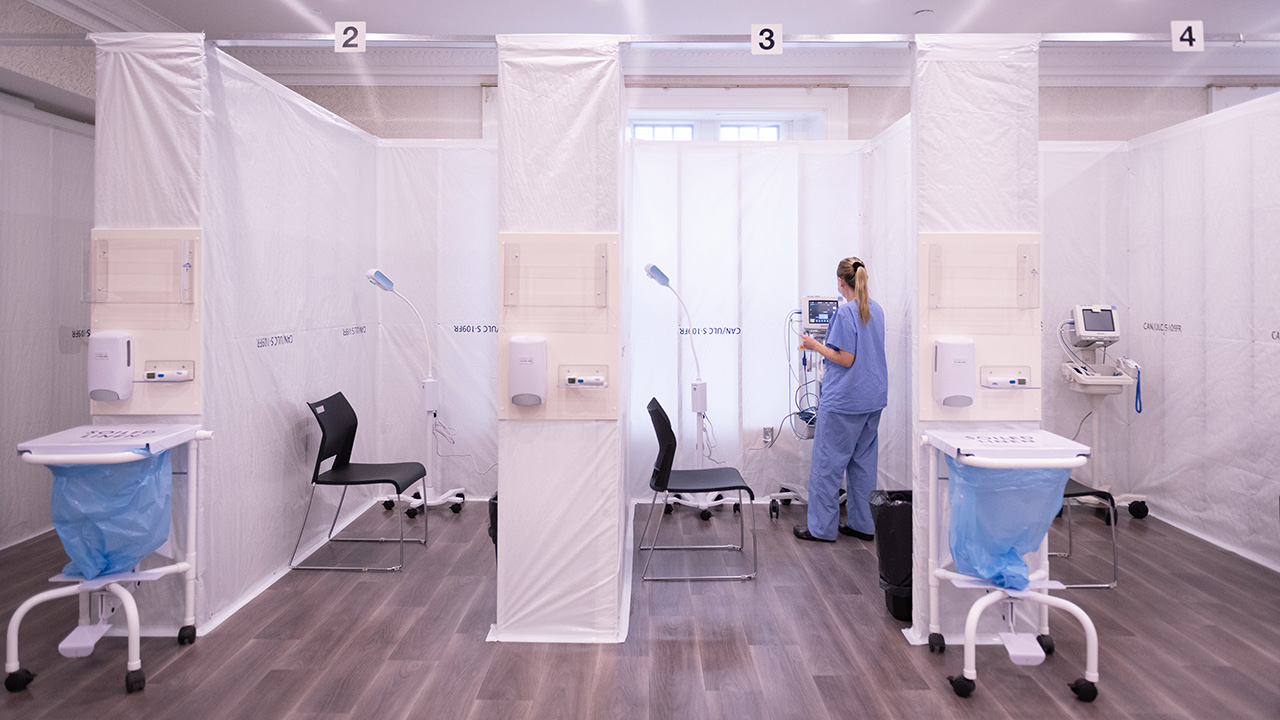Infection control measures in COVID-19 Assessment Centres are working, new study finds
Measures that include surgical masks have been effective in preventing transmission of COVID-19 among staff working in four COVID-19 Assessment Centres (CACs) in Toronto, a year-long study has found.
A group of researchers including Dr. Jerome Leis, Medical Director of Infection Prevention and Control at Sunnybrook Health Sciences Centre, hoped to answer two questions. First, were healthcare workers (HCWs) working in these centres at higher risk of testing positive for SARS-CoV-2, the virus that causes COVID-19, compared to the general population? And second, were the infection prevention and control (IPAC) measures in place at these centres, such as the use of surgical masks rather than N95 respirators, effective at protecting those performing nasopharyngeal testing in this high-risk setting?
After the group studied 12 months of data, Dr. Leis says the answers were clear.
“Our results show that when embedded within a comprehensive bundle of measures designed to minimize COVID-19 transmission, the use of surgical masks was effective in protecting HCWs given a rate of infection similar to a population average that included non-essential workers,” says Dr. Leis.
Of the 470 HCWs working in the four CACs, the positivity rate for SARS CoV-2 was 2.3%, compared to 2.2% in the Ontario population. In addition, no significant difference was observed in the rate of HCW infections between patient facing and non-patient facing roles, suggesting that when infections did occur, these were likely acquired in the community, and not during close contact with patients.
Of 354,027 patients tested in the four CACs during the study period, 21,951 were confirmed positive for the virus, a test positivity rate of 6%. While HCW exposures during testing were generally brief, it’s important to note that COVID-19 is most infectious immediately prior to and shortly after the onset of symptoms.
“COVID-19 cases diagnosed in a CAC, where patients are referred following a high-risk exposure or undergo testing at onset of their symptoms, are more infectious compared to a patient seen later in their disease course,” says Dr. Kevin Schwartz, a co-investigator of the study and Infectious Disease physician at St. Joseph’s Health Centre of Unity Health Toronto.
All four CACs, which included Sunnybrook, North York General Hospital, and Unity Health Toronto’s St. Joseph’s Health Centre and St. Michael’s Hospital, implemented the same IPAC measures for COVID-19 testing recommended by Ontario guidelines. This included performing hand hygiene and wearing a surgical mask, eye protection, gown and gloves, as per Canadian recommendations. Even after a repeat analysis that excluded the period where staff began to have access to COVID-19 vaccines, there was no difference in COVID-19 risk.
The researchers note that a detectable difference in SARS-CoV-2 infection risk would be expected if these practices were inadequate, given that these HCWs were within close contact to nearly 22,000 patients with COVID-19, were essential workers during periods of lockdown, and are more likely to be tested.
Dr. Leis says the study, which was recently published in Infection Control & Hospital Epidemiology, adds to the body of evidence supporting current IPAC measures.
“Ontario CACs were implemented at the very start of the pandemic and these quality assurance studies are helpful in confirming that the measures have been adequate,” he says.
Media contact
Sybil Millar
Communications Advisor
sybil.millar@sunnybrook.ca






